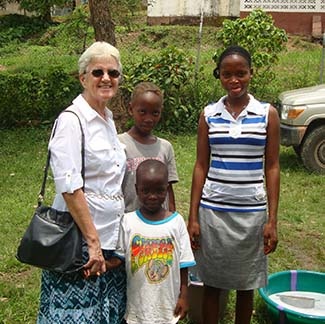 |
|
Sr. Ann Kelly ’68 knows firsthand the sorrow and devastation caused by the ebola outbreak in Western Africa for she is currently living in Liberia – the epicenter where the virus struck.
Sr. Ann is a member of the Missionary Sisters of the Holy Rosary, a Catholic order that has homes in Bryn Mawr and Ardmore. She has been working in the town of Foya, Liberia, where the first cases of ebola were diagnosed. Foya is in Lofa County which has had the most patients diagnosed and die from the virus in Liberia and among all of the five African countries affected to date.
“We are working with so-called safe villages to help them cope with the situation around them. One of the main areas we have been asked to address is the stigmatization of survivors. The villages are often unwilling to receive survivors back into the community,” Sr. Ann explained.
Another major issue that needs immediate attention is the growing number of children who have either survived the virus or have lost both parents to the virus. These children are often rejected by others in the village due to fear.
“We continue to trace families of children who have lost both parents to ebola. In one of the villages over 175 people died. Over 100 children were left orphaned,” she said.
Ebola has become a way of life for those living in the midst of this devastating disease. Precautionary measures are being taking by everyone in the afflicted areas.
“Even the smallest child carries her or his bottle of chlorine/water everywhere they go. They pray that ebola may not catch them,” Sr. Ann said.
There is a dire need for baby formula to feed the infants who have lost their mothers to ebola or have mothers with the disease. Even if the mother survives ebola, she will not be strong enough to breastfeed her baby for months. Sr. Ann and the other sisters have been able to provide this much needed formula.
Sr. Ann and her colleague Sr. Bridget Lacey are well aware of the daily challenge of taking the proper precautions to stay healthy. They have lost a few friends, including fellow nuns and a priest, who all had worked in the Catholic Hospital in Monrovia, Liberia.
The ebola crisis has far-reaching consequences in Liberia. According to Sr. Ann, the country’s economy is at an all-time low. Prices have skyrocketed and carrying goods to other parts of the country is difficult due to the check points along the way.
“There are so many sad stories to tell but there are so many brave stories as well. There are stories of great compassion that lift up your heart and keep one going,” she said.
She told the story of stranger arriving in a village being turned away in case she was infected. On her way out of the village a woman called and told her that she had emptied a room in her house where she could stay while they observed her for a few days. They alerted the health team who came to assess the woman and said that she was fine.
Sr. Ann gives enormous credit to the people of Liberia and their extraordinary capacity to pick up their lives and meet the challenge facing them head on.
“Their courage is humbling for those of us who are privileged to be on the path with them at this time. We no longer shake hands or hug each other. Yet being in Africa we still find moments to laugh and celebrate and trust that a new day will dawn,” said Sr. Ann.
While email communication is erratic, Sr. Ann has been able to send two letters to her supporters which explain her life and daily struggles.
“It is your support that keeps us going and it is your prayers and encouragement that is the greatest source of strength which helps us and the people of Liberia face each new day with hope,” Sr. Ann said in a recent correspondence.
 CHALLENGE
CHALLENGE





